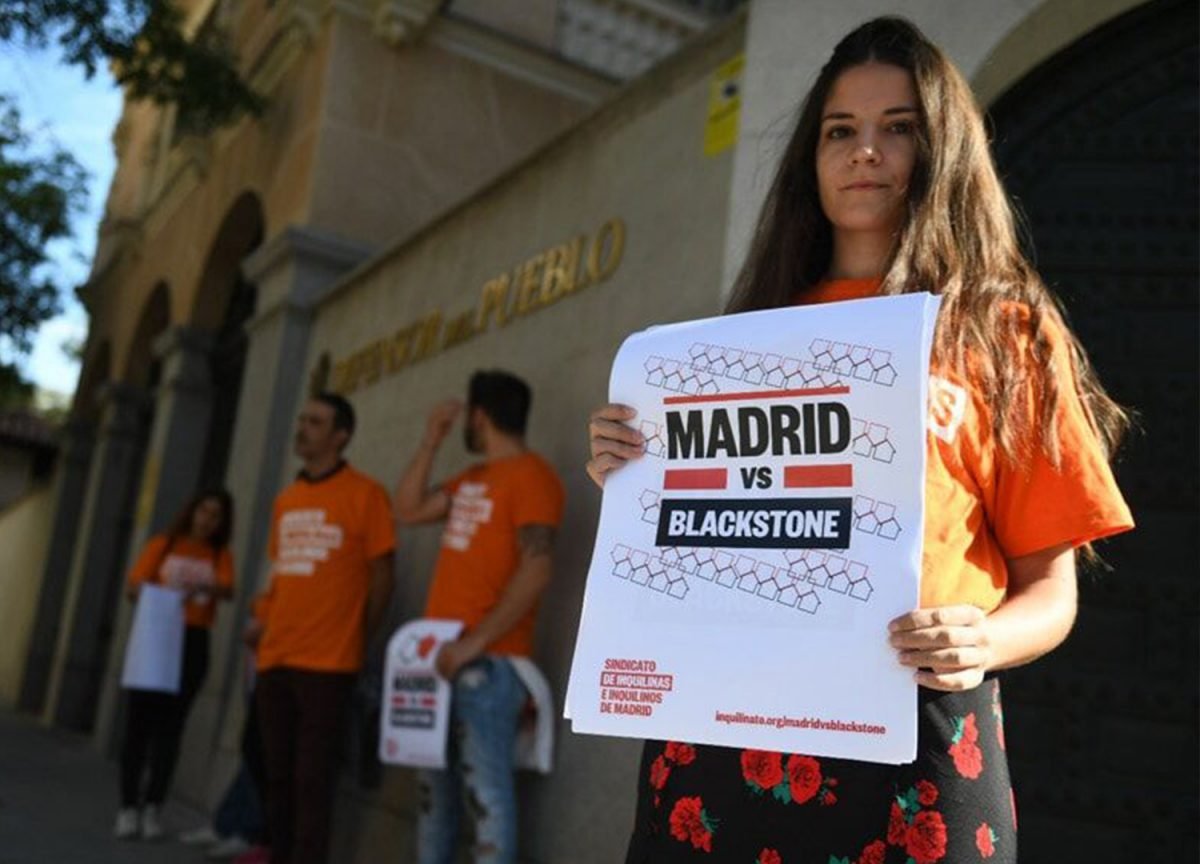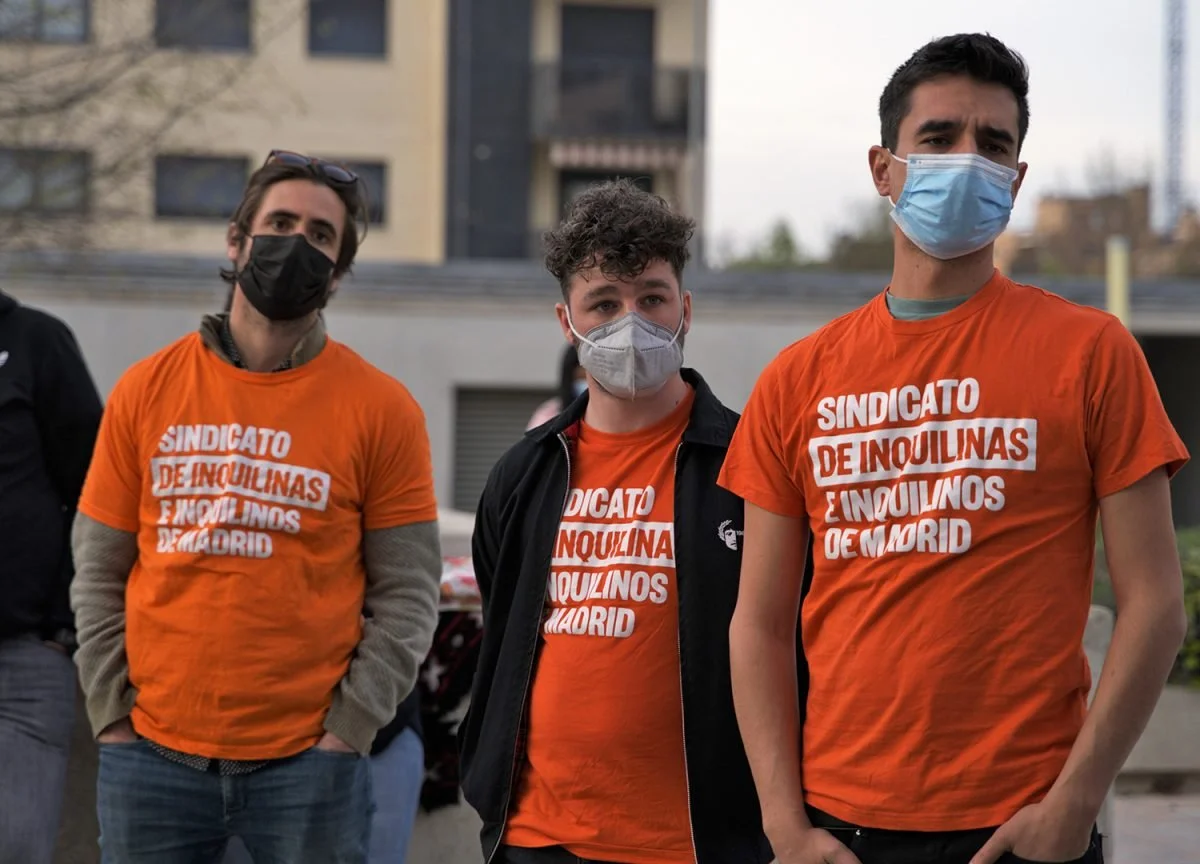Madrid: Renters Organize Against Blackstone And Win!
Since 2019, renters in the metro area of Madrid, Spain, have been organizing a campaign called “Madrid Against Blackstone.” Around a hundred households in Madrid Tenants Union beat back a 100% rent increase, resisted eviction, and won a contract from Blackstone where the corporate landlord has agreed to a one-time 8% rent increase, followed by no rent increases for seven years. In the two years before reaching the deal, the tenants refrained from paying double their original rent as part of their campaign – and they were able to keep these savings.
Voices from the ground
We spoke with Javier Gil, an activist with the Madrid Tenants Union, about the victory. The following is a lightly edited summary of our conversation.
What Is the Impact of Corporate Landlords in Spain?
Spain’s government has favored promoting homeownership. Like in the U.S., most people are homeowners, but the Spanish rental market is growing. There is little public housing and little government spending on public housing. Less than two percent of housing is social housing, and it’s impossible to get. You have to be very, very poor; when you apply, there’s a lottery.
After 2008, the foreclosure crisis hit Spain hard. So many evictions took place between 2008 and 2015. The housing movement for people affected by the mortgage crisis grew. The people losing homes mostly came from lower-income and migrant communities. Housing assemblies stopped evictions and held direct actions at banks. Thousands of people were squatting throughout the country, especially in big cities. Not just “radical” people, families who were not previously politicized were doing it, taking empty housing, sometimes entire blocks.
Afterward, banks and financial entities that took over foreclosed homes sold them to hedge funds like Blackstone. The government helped private equity landlords from the U.S. enter the Spanish housing market. In 2013, the right-wing government of Madrid sold 5,000 units of public housing to Blackstone and Goldman Sachs at a discount – below market price and construction costs. They evicted people in the process.
Last year, a court ruling declared the sale to Goldman Sachs fraudulent and illegal. The court ordered the housing to be returned and remade into public housing. But it’s complicated because Goldman Sachs had already sold many of the homes to other owners.
Today, Blackstone is the biggest homeowner in Spain and the largest private housing operator in the country’s history. After entering Spain’s housing market through the government’s sale of public housing, Blackstone started massively investing, buying portfolios of homes at very low prices from banks. In 2017, Blackstone acquired some huge Spanish banks; it partnered with Banco Santander to buy out a massive portfolio of housing assets from a bankrupt bank, Banco Popular. In 2015 and 2018, in six transactions between Blackstone, Cerberus, and Lone Star, they bought over 400,000 housing units.
Large corporate landlords have turned these housing units into rental properties with excessive rent increases. They bought homes with squatters and evicted them. Before, real estate companies and wealthy families owned Spain’s rental housing. Now, banks and international private equity funds have entered the rental sector, accumulating a massive number of units in a very short time. These private equity giants are very influential in the government and market.
In Madrid, Blackstone has been doubling its tenants’ rents.
How Did Your Campaign Organize to Win?
When Blackstone started raising rents by nearly 100%, Madrid Tenants Union said our strategy is we’re not going to pay. We’ll stay in the home even if the lease has finished. And not sign a new contract with abusive rent.
We’ve been doing this since 2017 when Madrid Tenants Union started. We started conflicts with the landlord and put them on social media. First, a building of Blackstone contacted us through social networks. We went to the building and had an assembly, saying, “what is happening to you is not only happening to you; we have to unite and resist.” Even if there’s only one household, we move forward and fight with them. But in this case, there were a lot. In one of the strongest buildings, people from 104 households joined.
The first Blackstone building that joined was on national TV. Other Blackstone buildings contacted us after that, and we held assemblies there. We formed “buildings in struggle,” and more Blackstone tenants saw. We were going all over Madrid because Blackstone was raising rents all over.
We had maybe 15 to 20 organizers at the height of the campaign – all volunteers. Some of us have flexible work; some are students. We come from PAH [Plataforma de Afectados por las Hipotecas] and other housing movements, squatting movements, social movements. Founders have years of experience in housing organizing. We have one central assembly that anyone can join. Tenant unions are rising in other cities. We are autonomous, but we coordinate.
Our civil disobedience strategy [of not paying the rent increase] was very important. Without that we’d be nothing, we’d just be demonstrating or on social media. But our civil disobedience creates a problem for Blackstone.
We put banners on balconies, demonstrated, went to Parliament, the media. Renters stayed in their homes, and instead of paying rent, we gave the previous rent amount [not including the rent increase] to the court [in escrow] and fought Blackstone. Our campaign, “Madrid Against Blackstone,” was very bad media for Blackstone. They were talking about Blackstone in Parliament, leftist parties were discussing it, and families were saying they can’t pay the 100% rent increase.
Blackstone started suing people in court. But tenants were still paying the old rent, just not the increase. (They paid it to the court, not directly to Blackstone, which was refusing to accept the rent as a way of forcing eviction.) As an act of civil disobedience, tenants were still being obedient to the old contract, showing there’s a will on your side to keep paying what you considered legitimate.
In the end, after two years of conflict, Blackstone sat and negotiated, although the law was on their side. There were over 100 homes in the struggle; we had buildings all over Madrid and cities in the region coordinating. At first, Blackstone simply offered a discount on the rent increase, and they sent letters threatening eviction to tenant union members. Some people left the fight and signed a new contract with the discount. But the discount really wasn’t enough.
Over 80 households stayed in the fight. In the end, we won an extremely favorable contract. Blackstone was pushing for smaller rent increases; we were fighting for no rent increases. We won. We won a reduction of the 100% rent increase to a one-time increase of 8% and no additional rent increase for seven years. And tenants saved money from the last two years of refusing to pay the rent increase.
Those who continued the fight are now paying 50% of what their neighbors are. Blackstone could have evicted 220 people and taken them to court. But the huge campaign, knowing we are a strong organization, they decided not to evict these 80 households because we’re already giving them bad press and would protest. They calculated it was better to settle.
What are Next Steps and Lessons?
Tenants didn’t know our power until the end of the struggle. We had more power than we thought we did! If we can defeat Blackstone, we can defeat other landlords.
And after this victory, even more Blackstone tenants contacted us with the same problem, so now we are again coordinating new buildings in the struggle against Blackstone.
Land and housing should be publicly owned, not monetized, not organized by the market, but by the use value of the house. Right now, we are fighting for laws protecting use value and against commodification – for rent control and taxes on vacant housing.
We hope the fight against Blackstone here can inspire campaigns in the U.S.A. and other countries! We’d read about the rent strikes in Harlem and the fights for rent control in New York and California – it inspires us a lot.
Photography courtesy Madrid Tenants Union




